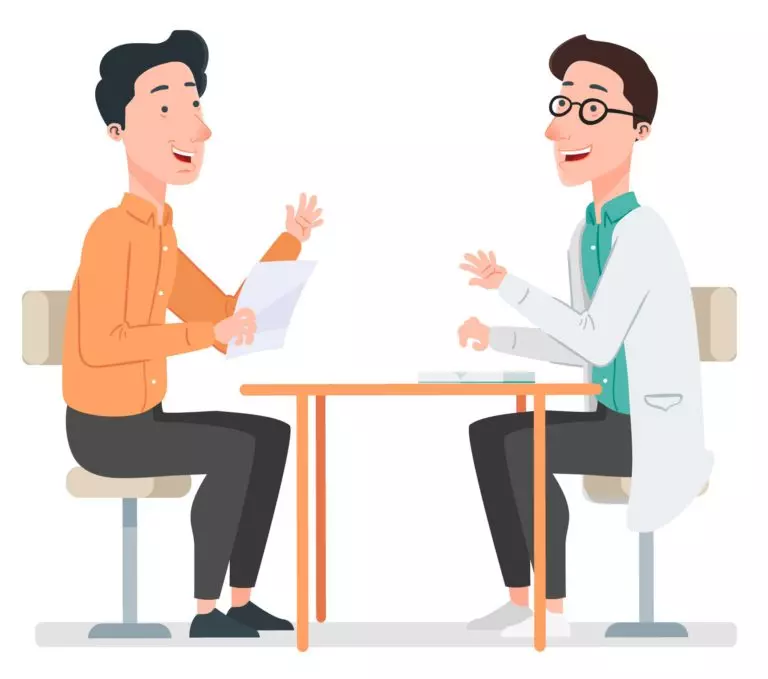
Allow me to give you the Patient Criteria for a good DBS candidate upfront. You are the ideal DBS candidate if you fulfil all the following:
| Go Ahead with DBS | Stop & re-consider |
|---|---|
|
1. Your life is significantly hampered, despite taking proper medications 2. If the diagnosis of Parkinson’s disease is sure, and there are no “red flags.” 3. You improve markedly with the “Levodopa Challenge test”. 4. You clearly understand the risks & success rates, and have realistic expectations |
1. If you have other serious medical problems which would make surgery risky. 2. If you are uncontrollably depressed. 3. If you have severe thinking & memory problems. |
Please try to understand this table entirely before you get DBS surgery done.
I will try to explain it to you, in the simplest possible terms.
Let us start.
Table Of Contents
- Who is a good DBS candidate?
- What is the reason you want to consider DBS?
- There is a good reason. What next?
- How can doctors predict if you will improve after DBS?
- How are other diagnoses ruled out?
- How can doctors predict long term side-effects from DBS surgery?
- Please summarize. Who is the ideal candidate for DBS?
- How do doctors verify these patient criteria?
- Do I need to fulfil all patient criteria to get DBS?
- Dr. Siddharth Kharkar
- NeuroPlus Epilepsy & Parkinson’s Clinic – Dr. Kharkar
Who is a good DBS candidate?
Please note that here, we will talk only about DBS for Parkinson’s.
DBS is used for other problems as well – including epilepsy. We will not talk about those conditions in this article.
DBS can result in good improvement in some Parkinson’s Patients. Videos such as the one below are genuine and very encouraging.
This video has been posted on Youtube by the Neuromedical Center in the USA.
All patients may not get the same benefit. So, proper selection of:
is very important.
Here we will talk about patient selection. The other topics are covered later.
Here is the first question to answer:
What is the reason you want to consider DBS?
There is only one reason to consider DBS.
You should consider DBS if – despite taking medications – your life is hampered by Parkinson’s Disease.
We call this “Disability”.
You know, even late-stage Parkinson’s patients improve after a single big dose of Levodopa!
So why are patient’s activities hampered? They are hampered because of motor fluctuations.
Let us look at the 2 most common fluctuations:
1. Predictable Wearing-OFF:
You might feel almost perfect after taking Levodopa. But the effect wears-off too soon.
It may wear off after 2 hours, or sometimes even after 1 hour. You can literally predict what is going to happen.
Then you take another dose, and you’re fine. But then within 1-2 hours, the same thing happens again!
Here is a video posted by Orion Pharma. A patient called Ms. Doreen describes her wearing-off symptoms:
This “Wearing-Off” problem is probably the most common reason for DBS surgeries.
2. Dose-Limiting Dyskinesias:
Initially, you took small doses of Levodopa.
As the years went by, you needed larger doses. Fine. You still improved
But some people notice that when they take larger doses, their body starts shaking.
For lack of a better description – these excessive movements look like slow break-dancing. These are called “dyskinesias”. They can be quite severe.
Here is a video of Dyskinesias caused by Levodopa. This video has been posted by a brave patient named Ms. Tessie on youtube.
So, some people are in a quandary. Don’t take enough Levodopa, and they become stiff. Take enough Levodopa, and get dyskinesias.
These patients cannot take as much Levodopa as they need because of severe “dyskinesias”.
The way out is DBS. STN-DBS makes you function even with a 50% levodopa dose. GPi-DBS is excellent in another way: You can read more here [STN versus GPi DBS].
There is a good reason. What next?
There are two essential goals of DBS surgery for Parkinson’s Disease:
Let us look at each one of these:
How can doctors predict if you will improve after DBS?
At present, we are not able to use DBS for Parkinson’s Plus Syndromes. PSP & other Parkinson’s plus syndromes do not improve after regular DBS.
So, a patient with a “Parkinson’s Plus Syndrome” is not a good candidate for DBS. At least, at present.
In the future, a modified DBS procedure may be useful in Parkinson’s Plus Syndromes. But at present, a major task before DBS is to confirm Parkinson’s disease and rule out other conditions.
If you really have Parkinson’s disease (and not a Parkinson’s Mimic), then there is an excellent chance of improvement after DBS.
How are other diagnoses ruled out?
Parkinson’s Plus Syndromes are diagnosed by talking and examining you. Doctors call this a “clinical diagnosis”.
The presence of some symptoms may warn you that you have a “Parkinson’s Plus Syndrome”. Doctors call these symptoms “Red Flags”.
Here is a list of such red flags:
| Red flags – you may have a “Parkinson’s Plus” syndrome instead |
|---|
|
When in doubt, blood tests, MRI or FDOPA scan may help to rule out other conditions. You can read more here [Conditions that look like Parkinson’s].
Levodopa Challenge Test:
Let’s say your doctor is sure that you have Parkinson’s disease.
What else does he/she do to predict DBS response accurately?
He/She give you a single big dose of Levodopa. This is called a “Levodopa Challenge”.
Doctors have discovered that the improvement after a large dose of Levodopa predicts improvement after DBS.

Let us say you markedly improve after the big levodopa dose. That’s great! This indicates that you will improve after DBS. You are a good candidate for DBS.
If you do not improve markedly after a big levodopa dose, you may still be a DBS candidate. But you will need to discuss the reasons why the challenge test failed, and the pros & cons of continuing with DBS.
How can doctors predict long term side-effects from DBS surgery?
You need to be fit to undergo DBS surgery. Most patients are fit.
After DBS surgery, you may have problems common to any surgery – such as infections. These are unlikely and discussed here [Click here].
But here, I want to talk about 2 long-term side-effects that are unique to DBS:
Depression:
Depression is common in Parkinson’s disease.
The limitations imposed by Parkinson’s may make you unhappy. Also, Dopamine is a chemical which keeps your mind “happy”. A decrease in Dopamine levels can cause you to become depressed.
If you are severely depressed – DBS of the STN can increase your depression.

This is usually a problem only with uncontrolled depression. If so, the doctor will wait until your psychiatrist can make it better.
Another alternative is to select the other target for DBS – the GPi. DBS of the GPi is less likely to worsen depression.
Yet another alternative is to do STN-DBS only on one side. Researchers have reported that one-sided DBS can improve depression.
References:
- Which target is best for patients with Parkinson’s disease? A meta-analysis of pallidal and subthalamic stimulation. Sako et al. J Neurol Neurosurg Psychiatry. 2014 Sep;85(9):982-6.
- The effect of unilateral subthalamic nucleus deep brain stimulation on depression in Parkinson’s disease. Birchall EL Brain Stimul. May-Jun 2017;10(3)
Problems with thinking:
Most patients with Parkinson’s have some problems with thinking and memory.
Usually, these problems are mild. They do not affect your day-to-day activities.

However, some patients may have severe trouble with memory. For example, – some patients may forget words while speaking. They may forget the names of near relatives.
If you have severe thinking/memory problems, you may have other conditions such as Alzheimer’s disease.
Also, DBS may not be a good choice for you. DBS may worsen memory in patients who have severe memory problems, to begin with.
How mild is “okay”?
As noted before, most Parkinson’s patients have mild thinking/memory problems. Yet, they can get DBS safely.
Neuropsychological testing can measure whether you have a “mild” or a “severe” thinking problem. Although it sounds fancy, neuropsychological testing is simple. It involves solving simple puzzles, remembering words, drawing some pictures etc.
Slightly low scores are okay. But if your scores are very low, your doctor may advise against DBS surgery.
Even in these cases, some doctors may advise you to get a GPi-DBS surgery (instead of not getting a DBS at all).
Please summarize. Who is the ideal candidate for DBS?
Here is the summary table from before.
It should be easier to understand now.
| Go Ahead with DBS | Stop & re-consider |
|---|---|
|
1. Your life is significantly hampered, despite taking proper medications 2. If the diagnosis of Parkinson’s disease is sure, and there are no “red flags.” 3. You improve markedly with the “Levodopa Challenge test”. 4. You clearly understand the risks & success rates, and have realistic expectations |
1. If you have other serious medical problems which would make surgery risky. 2. If you are uncontrollably depressed. 3. If you have severe thinking & memory problems. |
How do doctors verify these patient criteria?
In one word – carefully!
This answer is difficult to read. You may want to skim through it quickly.
Be sure to read the last question, though.
- Disability – Most physicians will use a scale to measure disability. The most frequently used one is Hoehn & Yahr Scale. The widely used UPDRS scale for Parkinson’s also measures disability.
- Fluctuations – You need to describe your typical day carefully. Keeping a symptom diary for a few days is very helpful.
- Confirming the diagnosis – In addition to talking and examining you, your doctor may order a few tests.
- Levodopa Challenge test: You are asked to stop medications the night before. In the morning, the doctor measures your movements on the UPDRS scale. He/She then gives you a big dose of Levodopa – up to 2 times your regular morning dose. Then, the doctor measures the UPDRS every 30 minutes. If the score improves by 30% or more, it is considered a marked improvement.
- Estimating Surgery Risk – You will see an anaesthetist before surgery. Your heart, lungs etc. are checked. This care is routine before any surgery.
- Depression – Most doctors will request a psychiatrist to see you. The psychiatrist may use scales such as the “Beck Depression Inventory” or the “Hamilton Depression Rating Scale” to measure your depression.
- Dementia – As mentioned, thinking/memory is measured by Neuropsychological testing. Neuropsychologists use many different kinds of tests. The test names are difficult! For example – “Rey Figure Copy”, “Rey Auditory Verbal Learning Test” etc… They also provide an easy to read summary on the last page of their report.
Another thing needs to be done. It is the most important thing.
A good heart-to-heart doctor-patient conversation is critical to decide if you are a good DBS candidate.
Do I need to fulfil all patient criteria to get DBS?
No.
Some patients can still get DBS even if they fail specific criteria.
For example, some patients may get very severe dyskinesias during Levodopa Challenge Testing. As a result, there may be no improvement in the UPDRS scores. These patients can still have DBS.
Some patients may have borderline severe depression or memory problems. After talking to your doctor about the risks and benefits, you could still consider GPi-DBS.
A good understanding of the criteria we discussed is essential.
But before taking any decision, talk to your doctor for personalized advice.

Caution: This information is not a substitute for professional care. Do not change your medications/treatment without your doctor’s permission.
